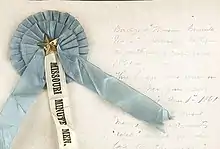.jpg.webp)
A secession badge, also called a secession cockade, was a decorative flower made of fabric or ribbon that was used to signal support for the secession of slave states from the United States during the sectional crisis that began in 1858. The badge was often attached with a pin that bore symbolic significance, such as a palmetto for South Carolina.[1][2][3] One memoirist recalled of the early days of the American Civil War, "...it was not uncommon to meet on Pennsylvania Avenue a defiant Southerner openly wearing a Virginia or South Carolina secession badge."[4] In December 1860, the Washington Star reported from the barroom of Brown's Hotel that someone claimed the Southerners had fired on Fort Sumter, and "One solitary secession cockade made its appearance during the evening, wearing a lonesome aspect, and evidently pining for sympathy that was not forthcoming."[5]
Additional images
 Unidentified young boy wearing secession badge and holding a rifle
Unidentified young boy wearing secession badge and holding a rifle Virginian in volunteer uniform with secession badge (Liljenquist collection, LOC)
Virginian in volunteer uniform with secession badge (Liljenquist collection, LOC) Private Peter S. Arthur of Company B, 11th Virginia Infantry Regiment
Private Peter S. Arthur of Company B, 11th Virginia Infantry Regiment Unidentified artilleryman wearing secession badge
Unidentified artilleryman wearing secession badge Cockade of the Missouri Minutemen, a secessionist paramilitary
Cockade of the Missouri Minutemen, a secessionist paramilitary
References
- ↑ Lossing, Benson John (1866). Pictorial History of the Civil War in the United States of America. G.W. Childs. ISBN 978-0-608-41363-1.
- ↑ Berry, Stephen William (2003). All that Makes a Man: Love and Ambition in the Civil War South. Oxford University Press. ISBN 978-0-19-517628-5.
- ↑ Duncan, Richard R. (2007). Beleaguered Winchester: A Virginia Community at War, 1861--1865. LSU Press. ISBN 978-0-8071-3579-2.
- ↑ Poore, Benjamin Perley (1886). Perley's Reminiscences of Sixty Years in the National Metropolis. Hubbard brothers. p. 80.
- ↑ "Down town last night". Evening star. 1860-12-29. p. 3. Retrieved 2023-12-29.